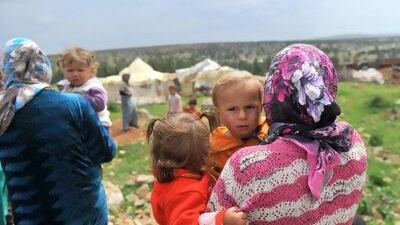KHERBET AL KHALDIYE //For millions of Syrians displaced by fighting, every day is a struggle to survive, and for those in Kherbet Al Khaldiye, that means eating and drinking whatever they can forage.
"We eat herbs and collect stagnant rainwater to drink and wash in," said 24-year-old Hisham, his head covered in a red and white chequered keffiyeh.
Hisham, who sports a budding blonde beard, was about to enter university when the fighting that has engulfed Syria erupted in 2011.
Now he has joined the wave of his compatriots displaced by the conflict.
In Kherbet Al Khaldiye, a makeshift camp near the Turkish border, Hisham shows a nearly dry rivulet of water, infested with fungi and insects, surrounded by a swarm of children, many of whom have contracted skin infections because of the dirty water.
Naida, 35, has seven young children. She bathes them in the infested water because the nearest clean water supply is several kilometres away.
"We pick herbs like mint and mallow in the countryside and we cook them. We don't have anything else to eat," she said.
"My husband used to work in a quarry, breaking stone but now we have no more resources and no one to help us. Once we brought a kilo of potatoes per family - how can we all live on a potato a week?"
Every so often, along with a group of other women, Naida goes to the nearest village in search of potable water.
"We carry the cans on our heads for several miles," she said, her blue eyes faded with exhaustion.
Aid groups are aware of the desperate needs of the population, but say they are struggling to meet those demands because of the dangers posed by fighting.
"It has become a struggle now to move food from one area to the other, with our warehouses and trucks getting increasingly caught in the crossfire," Muhannad Hadi of the World Food Programme (WFP), said yesterday. "The situation is particularly critical in conflict zones and some opposition-held areas where WFP has limited access and where millions of people are believed to be in acute need of food," the organisation added.
WFP trucks had been stopped at checkpoints and even hijacked, he added.
Ibrahim, 25, was living in a village near the Minnigh airport outside Aleppo city - a key flashpoint between Syrian rebel forces and the regime.
The non-stop air raids and shelling eventually forced him to flee, along with his two sons and about 20 other families.
His village was able to save a few of their animals and bring them along.
"Each day we slaughter a chicken like that one," he said, glancing at a paltry specimen as it passes.
"That chicken would be for all of us, can you imagine how much each person gets?" he said with a bitter smile.
More than a million Syrians have left the country since the peaceful protests against the regime of president Bashar Al Assad that began in March 2011 spiralled into a civil war after his forces unleashed a brutal crackdown on dissent. Last month was the bloodiest yet with 6,000 deaths, activist groups reported.
But not everyone is able to cross the border and escape the violence, with many lacking passports or sufficient money to make the journey. Those residents have been forced to seek the safest places they can within Syria.
For about 100 people here, the safest place available was this strip of countryside in Aleppo province, where they live among the scattered remains of Roman ruins, a few kilometres from the Turkish border.
At first, they were living in holes in the ground, lined with straw to provide some protection against the cold and the snow, Naida said.
Now they have managed to get tents marked with the logo of the United Nations refugee agency UNHCR.
In cold and unhealthy living conditions, the makeshift village struggles on with almost no access to medicine, particularly for sick children.
"By the time they get to the nearest pharmacy, in Azaz [in northern Syria] or in Turkey, the child is dead," 25-year-old Issa said, dressed in a warm coat in camouflage colours that came from Syrian rebel fighters.
Seated on a stone, set back from the other residents, 80-year-old Rajab observes the life of the makeshift village in the middle of nowhere.
"Under the tent, you feel the wind, the cold," said Rajab, the patriarch of a family of 40 people.
"Who can live in these conditions? Look around you, who can live like this?"


